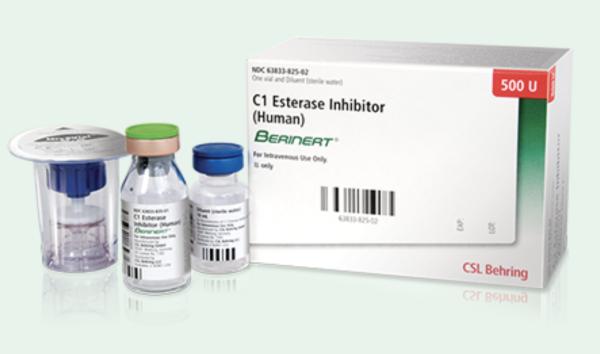Berinert Interactions
There are 51 drugs known to interact with Berinert (C1 esterase inhibitor (human)), along with 1 disease interaction. Of the total drug interactions, 4 are major, 46 are moderate, and 1 is minor.
- View all 51 medications that may interact with Berinert
- View Berinert disease interactions (1)
Most frequently checked interactions
View interaction reports for Berinert (C1 esterase inhibitor (human)) and the medicines listed below.
- acetaminophen
- Acid Reducer-Famotidine (famotidine)
- Actemra (tocilizumab)
- acyclovir
- albuterol
- Allegra (fexofenadine)
- arginine / citrulline / pine bark extract / rose hips
- ashwaganda
- aspirin
- clonazepam
- danazol
- diltiazem
- Firazyr (icatibant)
- Fish Oil (omega-3 polyunsaturated fatty acids)
- furosemide
- Ginkgo Biloba (ginkgo)
- glutathione
- glycine
- l-theanine
- Lexapro (escitalopram)
- metformin
- Metoprolol Succinate ER (metoprolol)
- nattokinase
- omeprazole
- Quercetin (bioflavonoids)
- saccharomyces boulardii lyo
- selenium
- taurine
- Vitamin C (ascorbic acid)
- Vitamin D3 (cholecalciferol)
Berinert disease interactions
There is 1 disease interaction with Berinert (C1 esterase inhibitor (human)) which include:
More about Berinert (C1 esterase inhibitor (human))
- Berinert consumer information
- Compare alternatives
- Pricing & coupons
- Reviews (2)
- Drug images
- Side effects
- Dosage information
- Patient tips
- During pregnancy
- FDA approval history
- Drug class: hereditary angioedema agents
- Breastfeeding
- En español
Related treatment guides
Drug Interaction Classification
| Highly clinically significant. Avoid combinations; the risk of the interaction outweighs the benefit. | |
| Moderately clinically significant. Usually avoid combinations; use it only under special circumstances. | |
| Minimally clinically significant. Minimize risk; assess risk and consider an alternative drug, take steps to circumvent the interaction risk and/or institute a monitoring plan. | |
| No interaction information available. |
See also:
Further information
Always consult your healthcare provider to ensure the information displayed on this page applies to your personal circumstances.


